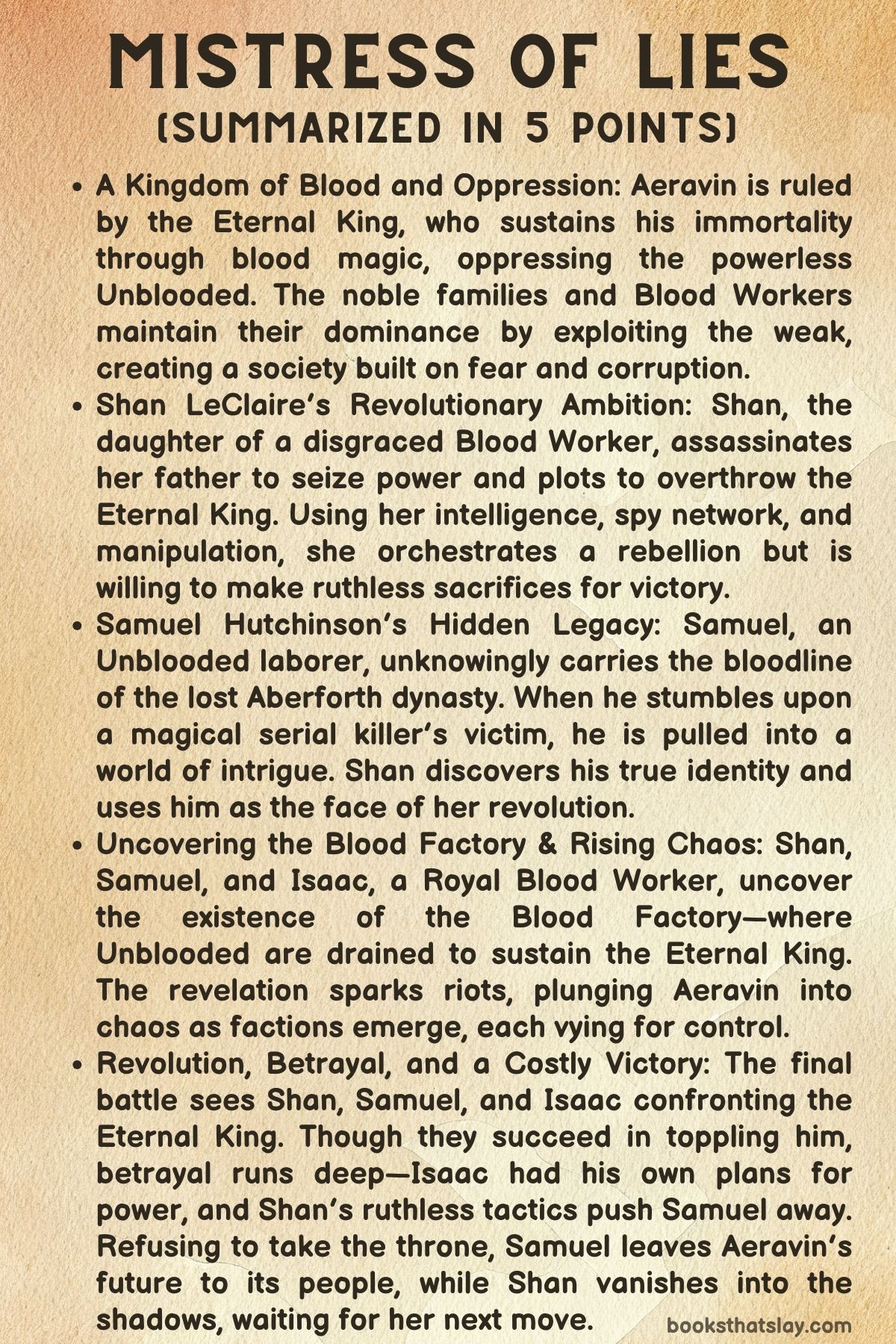Mistress of Lies Summary, Characters and Themes
Mistress of Lies by K.M. Enright is a gripping dark fantasy novel steeped in political intrigue, blood magic, and rebellion.
Set in the kingdom of Aeravin, where power is drawn from blood, the story follows two unlikely allies—Shan LeClaire, a cunning noblewoman orchestrating a revolution, and Samuel Hutchinson, a reluctant heir to a throne he never wanted. As they navigate a treacherous world ruled by an immortal king, their fates become entwined in a deadly game of deception, ambition, and betrayal.
Summary
In the kingdom of Aeravin, power is drawn from blood, and those without it—the Unblooded—are nothing more than pawns in a brutal system. The Eternal King, sustained by a relentless supply of stolen life force, rules with an iron grip, while Blood Workers, magic-wielding elites, enforce his will.
Against this backdrop of oppression, two unlikely figures rise: Shan LeClaire, a noblewoman with a vendetta, and Samuel Hutchinson, a man with a past he doesn’t yet understand.
Shan LeClaire is no ordinary noble.
The daughter of a disgraced but powerful Blood Worker, she has spent years maneuvering her way through Aeravin’s treacherous court. Her father’s fall from grace left her family weakened, but she has a plan to restore their power—not through submission, but through rebellion.
When she assassinates her father to protect her brother and assume control of the LeClaire legacy, she takes the first step toward dismantling the system that betrayed them.
Shan is ruthless and methodical, using her network of spies—her “birds”—to gather intelligence. But her greatest weapon is her ability to manipulate. She knows that to bring down the Eternal King, she needs a figurehead, someone the people can rally behind.
Samuel is an Unblooded laborer, struggling to survive in a kingdom that devalues those without magic. He wants nothing more than to live a quiet life away from the reach of the Blood Workers.
However, when he stumbles upon the first victim of a magical serial killer, he is unwillingly drawn into a world of intrigue and violence.
What Samuel doesn’t know is that he carries a secret buried in blood—he is an Aberforth, a lost heir to the very throne he despises.
Shan discovers his lineage and sees him as the key to her revolution. She convinces him to fight, using his anger and frustration to mold him into a symbol of rebellion. Though reluctant, Samuel cannot ignore the injustices around him.
As Shan and Samuel work together, they uncover one of Aeravin’s darkest secrets—the Blood Factory. Hidden beneath the city, this facility is where Unblooded citizens are abducted and drained to sustain the Eternal King and his Blood Workers.
This horrifying revelation fuels the growing unrest in the kingdom, and Shan seizes the opportunity to push her plans forward.
Among their allies is Isaac, a Royal Blood Worker with his own agenda. While he outwardly serves the king, Isaac secretly plots from within. At a grand public event, he exposes the truth of the Blood Taxes, revealing to the citizens that their sacrifices are not voluntary but enforced by a corrupt system.
The revelation sparks widespread riots, and chaos engulfs Aeravin.
With the city in turmoil, Shan moves to overthrow the king. However, Samuel begins to question the cost of their revolution.
He realizes that Shan, for all her charisma and intelligence, is willing to make ruthless sacrifices to achieve her goals. Their growing ideological divide puts them at odds, especially when Samuel discovers that Shan has kept crucial truths hidden.
Meanwhile, the Eternal King, aware of the rebellion, imposes martial law and cracks down on dissent. Noble factions fracture—some backing Shan, others desperate to maintain the status quo.
Amidst this power struggle, Isaac reveals his true intentions. He never intended to help Shan or Samuel but planned to use the rebellion to seize power for himself. His betrayal forces Samuel into an impossible position.
As the revolution reaches its climax, Shan, Samuel, and Isaac confront the Eternal King. The battle is fierce, and while they succeed in weakening the king, the cost is staggering—many of their allies perish, and Aeravin is left in ruins. In the final moment, Samuel makes a fateful choice.
Rather than seizing the throne, he exposes the truth to the people and refuses to continue the cycle of tyranny. By relinquishing his claim, he gives Aeravin the chance to forge its own path. Shan, seeing her dream of power slipping away, vanishes into the shadows, leaving her future uncertain.
The novel closes on a bittersweet note—Aeravin is free, but at a great cost. Samuel, once a nobody, becomes a reluctant symbol of change, while Shan, ever the strategist, disappears, her next move unknown. In a world where power is built on blood and betrayal, the fight for true freedom is far from over.

Characters
Shan LeClaire
Shan LeClaire is a complex and calculating character, driven by a deep desire to restore her family’s lost honor and gain power in a kingdom ruled by a corrupt and oppressive monarch. She is introduced as a noblewoman, but her true role in the story is far more intricate.
Shan has spent years perfecting her blood magic and building a network of spies—her “birds”—to manipulate events in her favor. She is ruthless in her pursuit of her goals, willing to go to extreme lengths, including assassinating her own father, to secure her position at the head of the LeClaire family.
Shan’s main objective is to bring down the Eternal King, and she envisions herself as the one who will replace him. Despite her clear ambition, Shan is not simply a power-hungry villain. Her motivations are deeply rooted in the desire for vengeance, and her political maneuvers reveal her intelligence and tactical brilliance.
However, as the story progresses, her willingness to make harsh sacrifices for her cause exposes her moral ambiguity and the dangerous extent of her thirst for control. Her interactions with Samuel, particularly her manipulation of his emotions and ideals, underscore her ability to lure others into her web of intrigue, making her both a formidable ally and a dangerous adversary.
Samuel Hutchinson
Samuel Hutchinson starts the story as an Unblooded laborer, a man who, despite his low status in the eyes of Aeravin’s aristocracy, is far more significant than he realizes. His life takes a dramatic turn when he stumbles upon the victim of a magical serial killer, pulling him into a world of blood magic, political intrigue, and rebellion that he had previously worked to avoid.
Unbeknownst to him, Samuel is the lost heir to the throne, making him a key player in the struggle for power in the kingdom. Although Samuel is initially reluctant to become involved in Shan’s plans for revolution, his deep resentment toward the monarchy and his own latent abilities make him a powerful figure in the unfolding events.
Samuel’s internal conflict is a central theme in the novel, as he grapples with his growing attraction to Shan, the moral dilemmas surrounding their shared cause, and his own understanding of what true justice and power should look like. He is not simply a pawn in Shan’s game; over time, he evolves into a symbol of change, one who rejects the notion of cyclical tyranny in favor of a more ethical, self-determined future.
Samuel’s ultimate decision to expose the truth and relinquish his claim to the throne marks his evolution from a reluctant participant to a morally grounded leader who refuses to perpetuate the oppressive systems he once despised.
Isaac
Isaac is initially introduced as a Royal Bloodworker, a member of the ruling elite whose loyalty seems unquestionable. However, his character is far more layered than his role suggests.
As a pawn in the royal system, Isaac serves as both an enforcer and a secret architect of his own rebellion. He has his own set of motivations that involve toppling the monarchy from within, making him an unpredictable figure in the power struggles between Shan, Samuel, and the Eternal King.
Throughout the novel, Isaac’s duality is revealed: on one hand, he appears to be a loyal servant to the monarchy, while on the other, he is working quietly to undermine the very system he serves. His knowledge of the hidden Blood Factory and his eventual exposure of the systematic murders to the public plays a pivotal role in inciting unrest across Aeravin.
Despite his role as a potential antagonist, Isaac’s actions ultimately suggest that his desire for power is fueled by a deep-seated belief in the need for change, though his methods may be just as destructive as those of the monarchy he seeks to overthrow. In the end, Isaac’s betrayal of both Shan and Samuel serves as a stark reminder of the dangers of power-hungry individuals in any revolution, further complicating the ethical landscape of the story.
Themes
The Corrupting Nature of Absolute Power and Its Impact on Society
In Mistress of Lies, one of the central themes is the corrupting influence of absolute power. This theme is explored in multiple facets through the hierarchy of the kingdom of Aeravin, where power dynamics are deeply entrenched in a system of blood magic and political intrigue.
The Eternal King, who sustains his immortality through dark, blood-based magic, embodies the danger of an unchecked rule. His reign relies on the suffering and subjugation of the Unblooded, the powerless citizens of the kingdom, who are treated as expendable commodities to fuel his continued existence.
This theme is further explored through the various characters vying for power, such as Shan LeClaire, who, despite seeking to overthrow the tyranny, finds herself drawn to similar ruthless strategies. The revolution she spearheads is not immune to the corruptive forces of power; her ambition and willingness to make extreme sacrifices ultimately blur the lines between freedom and oppression.
This exploration paints a grim picture of how those in positions of authority, whether tyrants or revolutionaries, are shaped by the very power they seek to wield.
The Struggle Between Destiny and Self-Determination in the Face of Overwhelming Circumstances
Samuel’s journey in Mistress of Lies is a poignant reflection of the age-old conflict between fate and free will. He begins the story as an Unblooded laborer, someone without status, whose life is shaped by the oppressive forces of the kingdom.
However, his discovery of his true heritage as a lost heir to the throne forces him into a world where he is increasingly drawn to a destiny he never sought. This theme is woven into the narrative as Samuel grapples with his identity and the expectations that come with it.
On one hand, his newfound heritage offers him the chance for revenge and revolution, but on the other, it places him at the heart of the very system he despises. The tension between what is expected of him by others—particularly Shan, who sees him as a key figure in her rebellion—and his internal conflict about his role in the larger political drama, highlights the difficult road of self-determination.
The theme questions whether anyone truly controls their fate, or if they are merely pawns in a larger game. Samuel’s ultimate decision to reject the throne, despite the temptation of power, signals his desire to forge a path that is truly his own, free from the weight of destiny imposed upon him.
The Ethical Complexity of Rebellion: The Fine Line Between Heroism and Villainy
The theme of moral ambiguity plays a significant role throughout Mistress of Lies, with the boundaries between heroism and villainy frequently called into question. Shan LeClaire, driven by a desire to restore her family’s honor and bring about a more just rule, is not simply a straightforward hero.
Her methods—manipulation, assassination, and betrayal—reveal a much darker side to her character. Although she positions herself as the leader of a revolution to overthrow the Eternal King, her willingness to make sacrifices that involve ruthless deception and the destruction of lives casts a shadow over her motives.
As the story progresses, it becomes clear that her vision of a better future may come at a terrible price. Samuel, too, struggles with this ambiguity.
Initially reluctant to embrace his destiny as a revolutionary figure, he becomes complicit in Shan’s schemes. Yet, his moral compass is tested as he witnesses the costs of rebellion, particularly the harsh realities of the Blood Factory and the lives that are sacrificed in the pursuit of change.
By the end of the novel, the theme of moral ambiguity comes to a head when Samuel chooses to reject both the throne and Shan’s machinations, exposing the brutal truth of the system while refusing to be part of the cycle of violence. This theme challenges the reader to consider whether rebellion, by its very nature, requires its participants to compromise their ethics or if it is possible to fight for change without losing one’s soul.
The Consequences of Revolution: Sacrifice, Betrayal, and the Cost of Freedom
Another central theme in Mistress of Lies is the devastating cost of revolution. The narrative emphasizes that every political upheaval demands a significant sacrifice, often from the very people who seek change.
This theme is explored through the personal and societal losses that arise as Shan and Samuel move forward with their plan to dethrone the Eternal King. The revelation of the Blood Factory and the public exposure of the Blood Taxes, which involve systematic murders to sustain the Blood Workers, serves as a catalyst for unrest, but it also triggers riots that devastate the city and lead to widespread chaos.
In the face of such upheaval, the characters are forced to reckon with the consequences of their actions. Shan, whose intelligence and cunning have made her a formidable figure, finds herself increasingly isolated as the cost of her revolution becomes clear.
Her willingness to manipulate and betray allies—most notably Samuel—reflects her belief that the ends justify the means. However, Samuel, who initially seeks revenge but grows conflicted by the mounting deaths and betrayals, ultimately decides that the cost of victory is too high.
His rejection of the throne and his decision to expose the truth to the people symbolize a refusal to continue the cycle of violence. This theme highlights the tragic reality that even the most well-meaning rebellions often result in deep scars, both for individuals and society, suggesting that true freedom may come at an unbearable price.


